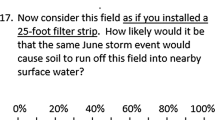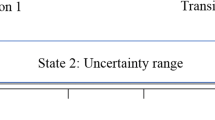Abstract
This paper discusses three main reasons why so many of the contingentvaluation studies conducted in developing countries are so bad. First,the contingent valuation surveys themselves are often poorly administeredand executed. Second, contingent valuation scenarios are often very poorlycrafted. Third, few CV studies conducted in developing countries aredesigned to test whether some of the key assumptions that the researchermade were the right ones, and whether the results are robust with respectto simple variations in research design and survey method. The paper concludesthat research on stated preference methods in developing countries iscritically important to the successful implementation of these methodsbecause (1) there is no empirical evidence to suggest that rapid,”streamlined” CV surveys yield reliable, accurate results, and (2)there is a significant risk that the current push for cheaper, simplerCV studies could discredit the methodology itself. Moreover, the policydebates to which CV researchers are asked to contribute are often oftremendous importance to the well-being of households in developingcountries. Because the costs of policy mistakes can prove tragic, itis critical that VC researchers push for excellence in this researchenterprise and that funding agencies think more carefully about thevalue of policy-relevant information in the fields in which thecontingent valuation method is being used to study household preferencesand behavior (e.g., water and sanitation services, urban air pollution,soil erosion, deforestation, biodiversity, watershed management,ecosystem valuation, vaccines for the poor).
Similar content being viewed by others
References
Bateman, I., I. H. Langford and J. Rasbash (1999), ‘Elicitation Effects in Contingent Valuation Studies’. Chapter 15 in Ian J. Bateman and Kenneth Willis, eds., Valuing Environmental Preferences: Theory and Practice of the Contingent Valuation Method in the US, EU, and Developing Countries. Oxford University Press, pp. 511–539.
Carson R. T., J. L. Wright, N. J. Carson, A. Alberini and N. E. Flores (1995), A Bibliography of Contingent Valuation Studies and Papers. San Diego: Natural Resources Damages Assessment Inc.
Carson, Richard T. (1997), ‘Contingent Valuation Surveys and Test of Insensitivity to Scope’, in R. J. Koop, W. Pommerhene and N. Schwartz, eds., Determining the Value of Non-Markets Goods: Economic, Psychological, and Policy Relevant Aspects of Contingent Valuation Methods. Boston: Kluwer, pp. 127–163.
Carson, R. T., N. E. Flores and N. F. Meade (2001), ‘Contingent Valuation: Controversies and Evidence’, Environmental and Resources Economics 19, 173–210.
Carson, R. T., N. E. Flores and W.M. Hanemann (1998), ‘Sequencing and Valuing Public Goods’, Journal of Environmental Economics and Management 36, 314–323.
Cropper, M., M. Haile, J. Lampietti, C. Poulos and D. Whittington (1999), The Value of Preventing Malaria in Tembien, Ethiopia. World Bank Policy Research Paper, No. 2273. December.
Davis, J., D. Gercheva, K. Komives and D. Whittington (1996), Household Water Supply Conditions and Willingness to Pay for Improved Services in Odessa, Ukraine (with Implications for Serving the Poor). A Report to the World Bank. October, 74 pp.
Davis, J. (1998), Assessing Community Preferences for Development Projects: Does Mode Matter? Ph.D. Dissertation. Department of Environmental Sciences and Engineering, University of North Carolina at Chapel Hill.
Davis, J. and D. Whittington (1998), ‘Participatory Research for Development Projects: A Comparison of the Community Meeting and Household Survey Techniques’, Economic Development and Cultural Change 41(1), 73–94.
Diamond, P. A. and J. A. Hausman (1994), ‘Contingent Valuation: Is Some Number Better than No Number?’ Journal of Economic Perspectives 8(4), 45–64.
Diamond, P. A., J. A. Hausman, G. K. Leonard and M. A. Denning (1993), ‘Does Contingent Valuation Measure Preferences? Experimental Evidence’, in J. Hausman, ed., Contingent Valuation: A Critical Assessment. Amsterdam, Elsevier Science Publishers.
Hanemann, W. M. and B. Kanninen (1999), ‘The Statistical Analysis of Discrete-Response CV Data’, in Ken Willis and Ian Bateman, eds., Valuing Environmental Preferences: Theory and Practice of the Contingent Valuation Method in the US, EU, and Developing Countries. Oxford University Press, pp. 302–443.
Lauria, D. T., D. Whittington and K. Choe (1999), ‘Household Demand for Improved Sanitation Services: A Case Study of Calamba, Philippines’, in Ken Willis and Ian Bateman, eds., Valuing Environmental Preferences: Theory and Practice of the Contingent Valuation Method in the US, EU, and Developing Countries. Oxford University Press, pp. 540–581.
Mitchell, R. C. and R. T. Carson (1989), Using Surveys to Value Public Goods: The Contingent Valuation Method. Resources for the Future. Washington D.C.
Pattanayak, S., D. Whittington, J. Yang and B. Kumar (2002), Willingness to Pay for Improved Water Supply in Kathmandu Valley, Nepal. Research Triangle Institute. Final Report to the Water and Sanitation Program for South Asia, New Delhi: World Bank. August, 2001.
Sen, A. K. (1973), ‘Behavior and the Concept of Preference’, Economica 40.
Whittington, D., V. K. Smith, A. Okorafor, A. Okore, J. L. Liu and A. McPhail (1992), ‘Giving Respondents Time to Think in Contingent Valuation Studies: A Developing Country Application’, Journal of Environmental Economics and Management 22, 205–225. Reprinted in Kenneth G. Willis, Kenneth Button, and Peter Nijkamp, eds., Environmental Valuation. Cheltenham, UK: Edward Elgar Publishing, 1999. Volume 1, Chapter 11.
Whittington, D. and J. Davis (1994), ‘A Review and Assessment of Techniques for Systematic Client Consultation’, A Report to the World Bank, Washington DC, December 16, 66 pp.
Whittington, D. (1998), ‘Administering Contingent Valuation Surveys in Developing Countries’, World Development 26(1), 21–30.
Whittington, D., O. Matsui-Santana, J. Freiberger, G. van Houtven and S. Pattanayak (2001), ‘Individuals' Willingness to Pay for a HIV/Aids Vaccine: Evidence for Guadalajara, Mexico’, Proceedings of the XIII International AIDS Conference. Durban, South Africa.
Whittington, D., D. T. Lauria and K. Choe (1997), ‘The Effect of Giving Respondents ‘Time to Think’ on Tests of Scope: An Experiment in Calamba, Philippines’, in Ray Kopp, Werner Pommerehne and Norbert Schwarz, eds., Determining the Value of Non Market Goods: Economic, Psychological and Policy Relevant Aspects of Contingent Valuation Methods. Kluwer Publishers, pp. 219–234.
Author information
Authors and Affiliations
Rights and permissions
About this article
Cite this article
Whittington, D. Improving the Performance of Contingent Valuation Studies in Developing Countries. Environ Resource Econ 22, 323–367 (2002). https://doi.org/10.1023/A:1015575517927
Issue Date:
DOI: https://doi.org/10.1023/A:1015575517927




